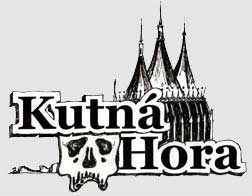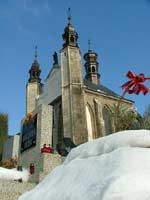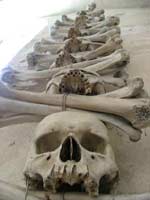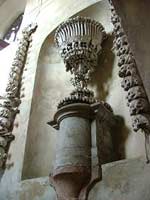Affordable travel in the Czech Republic |
Outside Prague |
| • Kutná Hora |
| • Litomyšl |
| • Olomouc |
| • Český Krumlov |
| • Karlovy Vary |
| • Mělník |
| • Kutná Hora |
| • Karlštejn castle |
| • Terezín |
| • Lidice |
| • Adršpach Rocks |
| • Bohemian Paradise |
| • České Budějovice |
| • Český Ráj |
| • Hradec Králové |
| • Liberec |
| • Plzeň |
| • Telč |
| Mikulov |
| Ostrava |
The Bone Church
This direct association with the holy land led to the graveyard becoming a sought after burial site among the aristocracy of Central Europe. At the time of the thirty years’ war in the 17th century, the number of burials outgrew the space available, the older remains began to be exhumed and stored in the chapel, and it’s estimated that the chapel now contains the bones of up to 40,000 people. Noughts and crosses The lower floor of the chapel is partially below ground level and its square floor plan is divided into thirds both across its length and breadth, something like a giant noughts-and-crosses board. In each of the corners, there is a gigantic pile of skulls and bones, maybe four metres square on the ground and three metres high. This leaves a cross shaped area open to walk around. One point of the cross is taken up by the staircase leading down from the street and a small altar occupies the opposite arm. Above the centre hangs the chandelier that is often touted as the highlight of the bone church because it contains at least one of each bone in the human body. Why?
The decorations and sculptures were created though by a woodcarver named František Rint. In 1870, he was commissioned by the landowners of the time, the Schwarzenberg family, to decorate the chapel with the bones and create a reminder of the impermanence of human life and inescapable death. Candelabra, chalices, coats of arms
My personal favourite is the coat of arms of the Schwarzenberg family, especially the segment depicting a raven picking the eye from an invading soldier. If you’re going to depict a raven eating somebody’s eye, what more appropriate medium could there be? 'It’s the living who scare me' The bone church is open 7 days a week year round, except on the 24th and 25th of December. Entry is 40Kč for adults, 20 for students, and a photography permit is an extra 30Kč. Explanatory texts in a variety of languages can be borrowed from the cashier’s desk. Visitors to the bone church often describe it as macabre, eerie or creepy and I once asked the lady at the desk if she ever felt bothered to be working there. She flipped her hand in a dismissive way and said “Pfft! They’re only bones, they won’t hurt you; it’s the living who scare me”. Good point. Kostnice See also Mělník bone church |
 |
See and Do |
| • Kutná Hora Overview |
| • Daytrip to Kutná Hora from Prague |
| • Bone Church |
| • St. Barbara's cathedral |
| • The Silver Mines |
| • The Royal Mint |
| • The Streets and Squares |
Eat, Drink and Sleep |
| • Dačický beerhall |
| • Restaurant V Ruthardce |
| • Hotel/Pension U Kata |
| • Check Kutná Hora Hotel Rooms |
| • Check availability of Prague Rooms |
| Getting there |
| • Getting to Kutná Hora |
| • Kutná Hora Daytrip map to print |
• Home •Blog• About• Contact• Sitemap •Links•
Outside Prague last updated June 13th, 2010. All text and images Copyright 2007-2010. Articles may be excerpted for review, or printed for use by individual travellers.
Complete articles or images may not otherwise be reproduced by print, electronic or other means.
 The well-known story of the Bone Church (‘Ossuary’ to be more correct or ‘Kostnice’ in Czech) in Kutná Hora is that, in the 13th century, Jindřich, the abbot of Sedlec monastery, returned from a visit to Palestine with a pocketful of soil and sprinkled it on the cemetery surrounding the Chapel of All Saints.
The well-known story of the Bone Church (‘Ossuary’ to be more correct or ‘Kostnice’ in Czech) in Kutná Hora is that, in the 13th century, Jindřich, the abbot of Sedlec monastery, returned from a visit to Palestine with a pocketful of soil and sprinkled it on the cemetery surrounding the Chapel of All Saints.  Urban myth has it that a monk went mad and made things from the bones, and there are stories to suggest that partially blind monks entrusted with the care of the chapel were the first to begin piling the bones into geometric shapes.
Urban myth has it that a monk went mad and made things from the bones, and there are stories to suggest that partially blind monks entrusted with the care of the chapel were the first to begin piling the bones into geometric shapes. As well as the chandelier, there are strings of skulls and bones hanging from the ceiling, skull candelabra, a display case showing skulls with wounds inflicted by various mediaeval weapons, chalices that stand in alcoves either side of the staircase, and Mr. Rint’s signature picked out in finger bones.
As well as the chandelier, there are strings of skulls and bones hanging from the ceiling, skull candelabra, a display case showing skulls with wounds inflicted by various mediaeval weapons, chalices that stand in alcoves either side of the staircase, and Mr. Rint’s signature picked out in finger bones.